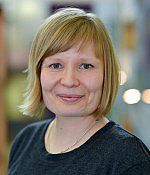New £1.25 million study will explore how to deliver a fair and just Net Zero transition
By: Neil Vowles
Last updated: Friday, 20 September 2019

A new three-year research project led by the University of Sussex will explore ways to ensure that the UK’s shift to a low-carbon society does not leave anyone behind.
FAIR (Fuel and Transport Poverty in the UK’s Energy Transition) will explore the causes and links between fuel poverty and transport poverty in England, Scotland, Wales and Northern Ireland before drawing up policy recommendations designed to limit their impacts in the transition to a more sustainable future.
The project will be a part of the Centre for Research into Energy Demand Solutions (CREDS).
The study’s principal investigator is Dr Mari Martiskainen, a Senior Research Fellow at the University of Sussex’s Science Policy Research Unit (SPRU) and Sussex Energy Group (SEG).
She said: “This study is pressingly needed to ensure that as the UK undergoes a significant and very necessary decarbonisation effort of Net Zero by 2050, innovations such as vehicle electrification and ‘smart’ technologies do not create new injustices.
“We will be looking at who is currently vulnerable to fuel and transport poverty in the UK and to what extent and why but also how will that change over time.
“Fuel and transport poverty have until now typically been treated as distinct problems in the UK with their own causes and consequences but we argue that they are in fact deeply interlinked and potentially mutually reinforcing.
“It is also pleasing for me personally to lead a project which includes several early career women, especially in light of the considerable gender imbalance that still exists in UK energy research.”
More than 3.5 million households live in fuel poverty in the UK while best estimate figures for transport poverty put the figure at around 2.5 million households.
Fuel poverty can have a significantly detrimental impact on the health of individuals who lack the resources to adequately heat their home while transport poverty can leave households at risk of being cut off from work and healthcare.
The project will include:
• Interviews with both rural and urban households to identify and examining the circumstances that leave some vulnerable to fuel and transport poverty.
• The application and analysis of primary and secondary data to map the variation of fuel and transport poverty patterns across the UK.
• Modelling of future scenarios to estimate the impact of low-carbon energy and transport policies on key indicators such as unemployment, sectoral employment, household incomes and wage rates.
• Explore policy proposals to enable just and fair transitions particularly for vulnerable groups.
CREDS director Nick Eyre said: “I am delighted about this exciting new research project within CREDS. Energy demand is going to change radically in coming decades to deliver the goals of a zero-carbon energy system.
“It is important that equity and justice are fully taken into account in this transition, so that we understand how benefits can be achieved by those in the most need.”
Also involved in the project are:
Dr Kirsten Jenkins, University of Edinburgh
Professor Stefan Bouzarovski, University of Manchester
Professor Benjamin Sovacool, University of Sussex
Dr Neil Simcock, Liverpool John Moores University
Dr Paul McKenzie, University of Ulster
Dr Debbie Hopkins, University of Oxford
Dr Giulio Mattioli, TU Dortmund University, Germany [Consultancy]
And three external partners:
Cambridge Econometrics
Energy Saving Trust
Green Alliance
